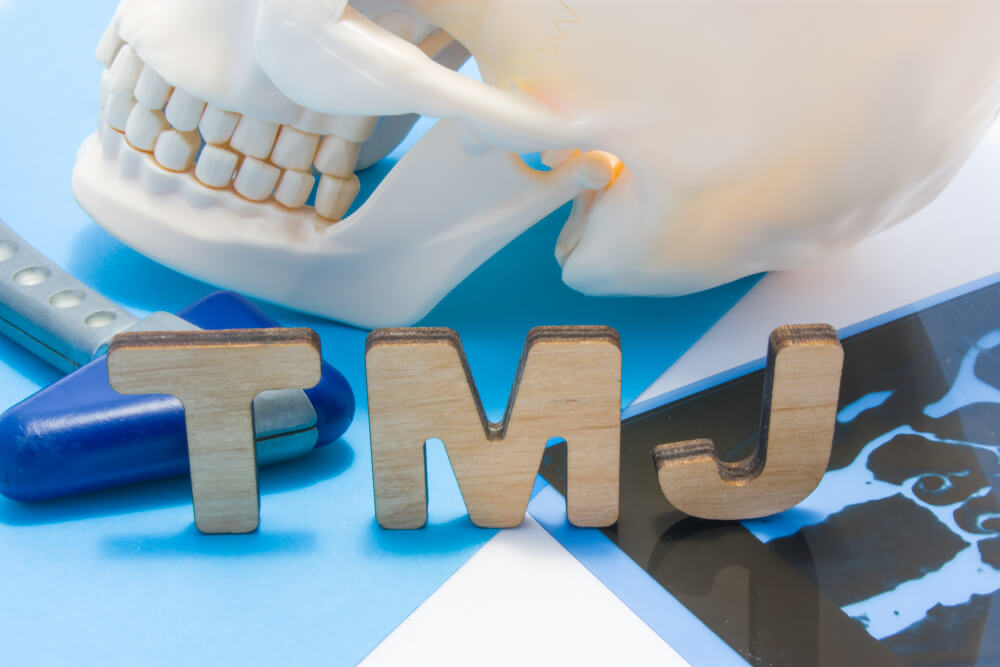At Alexandra S. George DDS | Pittsburgh Dentist, we’re known for our TMJ/TMJD specialized treatment. Dr. Alexandra has participated in extensive training at the Las Vegas Institute for Advanced Dental Studies (LVI), accruing over 400 hours of education. This accomplishment has earned her the prestigious title of LVI Fellow, a distinction held by only a few dentists worldwide. Her expertise is in the neuromuscular treatment of TMJD, utilizing cutting-edge technology to diagnose and address the root causes of pain.
If you think you may be suffering from TMJ, you likely have a lot of questions about causes, symptoms, and possible treatments. Here are some of the most frequently asked questions about TMJ and TMJD.
What Causes TMJ Disorders?
TMJ disorders can be caused by a variety of factors, including teeth grinding or clenching (bruxism), arthritis in the jaw joint, malocclusion (when teeth don’t fit together correctly), and stress, which can exacerbate symptoms like teeth grinding and poor posture.
Can TMJ Disorders Cause Ear Pain and Migraines?
Yes, TMJ disorders are known to cause ear pain due to the proximity of the TMJ to the ear, potentially leading to misinterpretation of joint pain as earache. Migraines and headaches are common complaints associated with TMJ disorders, often accompanied by tenderness in the jaw, head, neck, and facemuscles.
Is Surgery Required for TMJ Treatment?
Surgery is not always required for TMJ treatment. Non-surgical options, including a neuromuscular orthotic, crowns, braces, and DTR therapy should be considered first. Surgery may be considered in more severe cases where other treatments are ineffective. With our advanced technology and non-invasive treatment options, we see a lot of success without surgery.
Are TMJ and Sleep Apnea Related?
There is a connection between TMJ disorders and sleep apnea. Obstructions causing sleep apnea may be related to TMJ, and jaw alignment treatments can alleviate both conditions.
Can TMJ Disorders Resolve On Their Own?
TMJ disorders do not typically resolve on their own without treatment. Symptoms may temporarily subside in some cases, such as those related to stress, but without addressing the underlying cause, symptoms are likely to return or worsen over time.
How Are TMJ Disorders Diagnosed?
Diagnosis involves a comprehensive review that may include checking the range of motion in your jaw, looking for areas of discomfort or tenderness, and possibly using imaging tests such as dental X-rays, CT scans, or MRIs to get a closer look at the jaw and surrounding structures.
What Should You Avoid If You Have TMJ?
Avoid hard or chewy foods, reschedule routine dental visits if you’re experiencing severe pain, support your jaw when yawning, and refrain from activities that exacerbate jaw pain, such as nail biting, yelling, and singing.
How Can TMJ Pain Be Alleviated At Home?
Managing TMJ pain at home can include eating soft foods, applying heat or cold packs to the jaw, practicing relaxation techniques, and avoiding habits that strain the TMJ, like gum chewing and teeth grinding.
How Can a Dentist Help with TMJ Issues?
Dentists can provide treatments, including custom-fitted oral appliances to alleviate symptoms and prevent teeth grinding to improve jaw function and alleviate pain.
What Treatment Options Are Available for TMJ Disorders?
Based on the nature and complexity of your TMJD symptoms, several treatment options might be suitable for you, including:
- Disclusion Time Reduction (DTR): DTR is a targeted approach to optimize the time it takes for your teeth to disengage during opening and closing movements, potentially easing TMJD symptoms.
- Orthotic Appliances: These are designed as a semi-permanent remedy for jaw discomfort, offering a way to adjust the lower jaw into its ideal neuromuscular position, thereby alleviating the symptoms associated with TMJD. Although removable, they can be worn for up to 24 hours daily, providing continuous relief.
- Crowns: Tailored to address the entire mouth or specific areas, crowns serve as a non-removable solution to maintain a pain-free alignment similar to that achieved with orthotic appliances. This option is particularly beneficial for individuals who have experienced significant tooth wear due to grinding, as it helps to restore the original tooth structure and enhances your smile.
- Braces: Unlike traditional braces that focus solely on aesthetics, our braces aim to correct the functional alignment of your teeth and jaw. The goal is to reposition your teeth and adjust your jaw and bone structure to a more comfortable and lasting alignment.
Each of these treatments is selected and customized based on the individual’s specific needs, aiming to reduce discomfort and improve oral function and aesthetics.
Can TMJ Disorders Be Prevented?
While not all TMJ disorders can be prevented, especially those due to genetics or unavoidable factors, reducing risk factors like gum chewing, practicing good posture, managing stress effectively, and wearing protective mouthguards during sleep can help.
Choosing Alexandra S. George DDS For Your TMJ Treatment
When you choose Alexandra S. George DDS | Pittsburgh Dentist, you’re choosing a specialized team renowned for our TMJD treatments. By utilizing the latest technology and our proven approach to providing the best care for our clients, we can help reduce pain and provide an improved quality of life. If you want to learn more about our TMJD treatment options, visit our website or book an appointment today.


